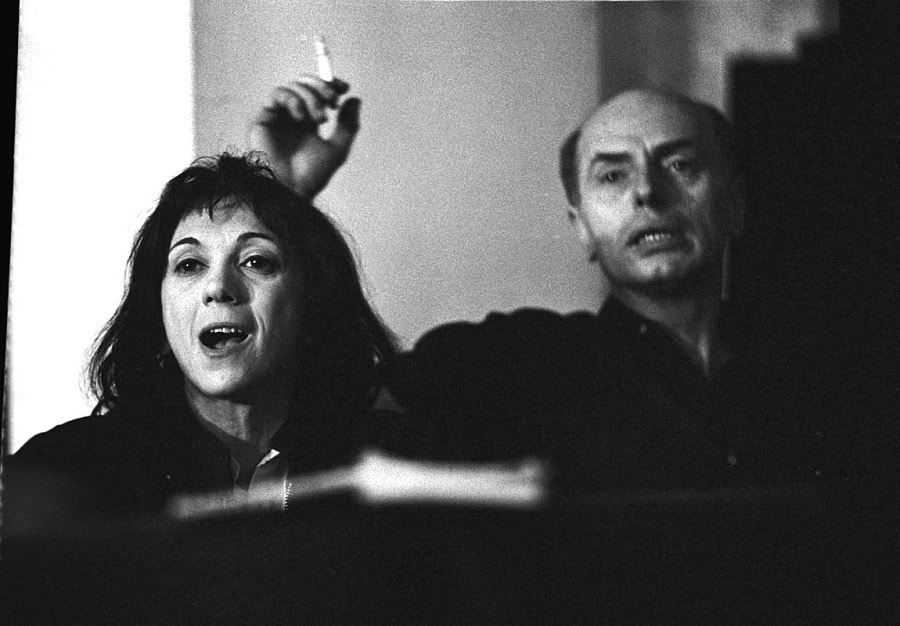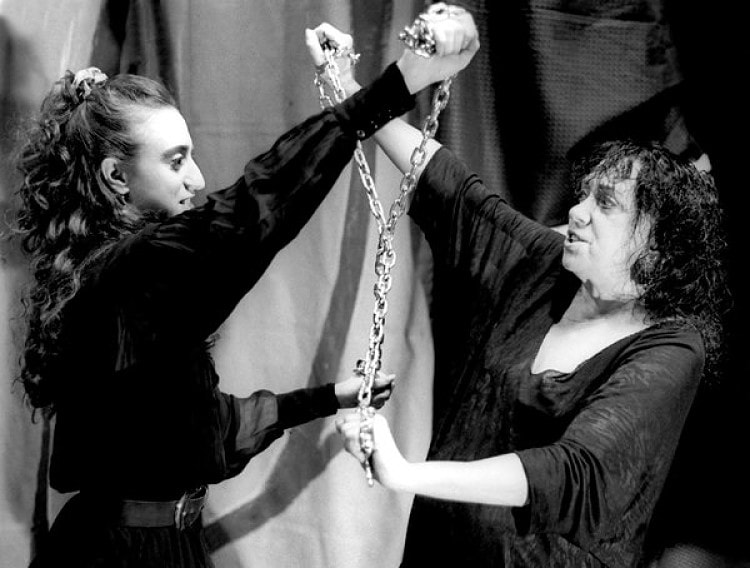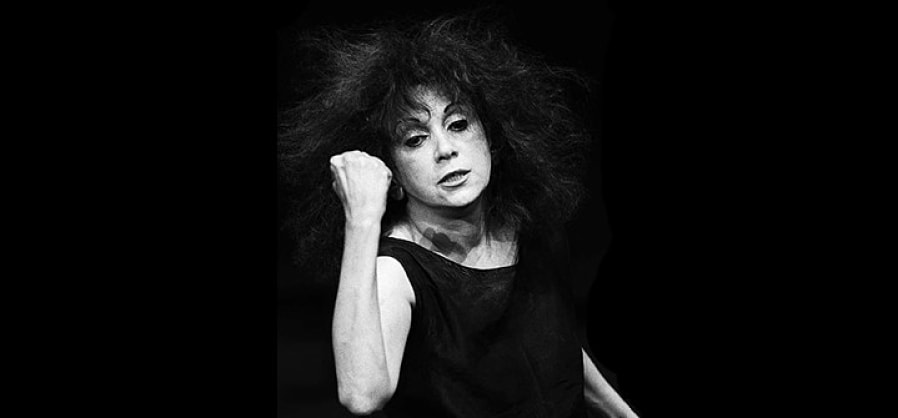For Judith Malina, art and love were never separate. This, then, is a collective love story.
I nearly fell out of the balcony at the Brooklyn Academy of Music in 1969 trying to get closer to Antigone’s mesmerizing choral movements. An intensity I had never before witnessed on the stage seemed to be reaching up to pluck me from my perch and plunge me into a new, charged and meaningful world of fateful choice. Over the years since 1947, when the Living Theatre was founded by Malina and Julian Beck, thousands of people have left their seats to find their place onstage in one or another of their spectacles; hundreds have become members of the company.
If a director can master the chorus, one can do the Greeks; if not, not. And Judith had found a way to bring the chorus–hence Brecht’s version of Sophocles’ play–alive. “The confrontation of the cerebral formulations of Brecht and Sophocles with the visceral passions of Artaud made Antigone a powerful articulation of the meaning of those times,” Judith wrote. By “those times” she meant times in which the crowd had to choose to stand with the tyrant or with the radical girl, Antigone, who refuses to be cowed—Vietnam times, but also, except for our quiescence, times not unlike our own.
Antigone stayed in the Living’s repertoire for 20 years; Judith would perform the title role while pregnant with Isha Manna, then as middle-aged, finally as an older woman, always with the unwavering, direct idealism of the girl.
I can hear that vibrant tremor in her voice that stayed with her till the end as she charged across a crowded room and took me into an embrace, saying, “I finished your book at 4 a.m. and I feel so close to you.” It was 1972 at a women’s theatre weekend at the Quaker Meeting House in Gramercy Park. My People’s Theatre had just been published, with chapters on the Federal Theater, the Living, the Open and Bread and Puppet, and a preface by John Howard Lawson, one of the Hollywood Ten. Judith ferried me across the bridge and we marveled at the lights on the river; every journey with Judith was always a chance to marvel, for life with her was forever an improvised show.
We ended up at St. Felix Street in Brooklyn, now lined with renovated brownstones, then a slum where Harvey Lichtenstein housed the Living company, while across the street, in what is now the chic BAM café, they rehearsed The Money Tower play for performances outside factories in Pittsburgh. Julian stood in the kitchen in Indian tunic and flip-flops, stirring a pot of vegetarian chili. Judith and I excused ourselves and went upstairs. Though I never joined the company—I was a playwright, hence not a good collective member— and our physical love affair was brief, the love never wavered in the years since that night.

Today as I write—the day after her death at 88, on April 10—her ardor and her exhortations to carry on one’s art, to feel vibrant and alive, remain as a goad not just to me but to all the artists over the years I met through her: graphic designer Luba Lukova; scholar/director Cindy Rosenthal; actor/director Lois Kagen; my collaborator and husband, George Bartenieff, who acted with Judith at Piscator’s Dramatic Workshop as a child, was in the original Brig and starred in my play Us in 1987, which was the first scripted poetic play Judith play directed after Julian’s death; playwright Hanon Reznikov, Judith’s beloved second husband and longtime codirector; Tom Walker, who with Brad Burgess and Garrick Beck, Judith’s son, will now direct the Living; and many others, including Joe Chaikin, Al Pacino, Shirley Clarke, Martin Sheen, Jack Gelber, Warren Finerty, Steve Ben Israel and Jenny Hecht.
If Judith (or Julian, or better, both) were to choose you, they embraced you completely; your work to them was a blessing to be cherished, and though you might argue aesthetics fiercely, they never judged. We talked endlessly; she held forth on politics, poetry, history, the great writers, many of whom she knew: Pound, Auden, Genet (“He didn’t like me because I was a woman”). Being in her presence was a hint of the “beautiful, nonviolent anarchist revolution” Judith spoke of so often—a world of commonality, yet deeply individually driven; a world of shared yet distinctive visions and bold, uncompromising actions; of intellectual rigor; plus a great deal of laughter.
Judith’s productions had a wild blend of alarming amateurism and astonishing skill. She worked with characters off the street and put them seamlessly into plays featuring the highly trained. Her ability from early on to bring strange combinations of alluring personalities into the world of her vision contributed, too, to the hypnotic effect of her strongest work.
In rehearsal, Judith electrified with brilliant talk. She told stories from her life that felt at first tangential to the play but worked their way into the actors’ psyches. During Us, a steamy sexual drama, she related at length her job in a laundry—unpacking other people’s dirty linens, discovering their detritus in a boiling hot room, her cotton uniform stuck to her sweaty body. She staged Us on a set designed by Ilion Troya that was 60 feet long, 30 feet high and 3 feet deep. The two actors were always on the edge.

She staged The Connection as a loopy heroin high with junkies, actors and jazz musicians; The Brig with enforced militaristic rigor behind prison bars. Seven Meditations on Political Sado-Masochism, made after the company’s imprisonment in Brazil alongside Brazilians who were being tortured (“Talk about the torture,” they had asked the theatremakers), was a witnessing drama in which, climactically, a naked man, electrodes clipped to his genitals and hung by his knees from a torturer’s parrot perch, was ritually moved around the space.
In her last play, No Place to Hide, the audience completely merges with and controls the action; personal stories are elicited one by one. Even I, who love the separation between actor and audience precisely because the audience is thereby free to imagine without having to perform, must admit that she succeeded completely in erasing the line between performer and watcher, and that her project has unalterably affected mine. For we who count ourselves among the Living are always looking for unique ways to move an audience so that they feel more deeply, and their perceptions, even their ways of being in the world, are altered.
Judith remained always a writer and a lover of language. She kept a daily diary, some of which has been published (The Enormous Despair and The Diaires of Judith Malina 1947-1957), with more to come. She also wrote peoms; Hard Lessons is among her last:
Learn patience first,
And after patience, love,
And after love
The eternal joy
Of having loved.
Karen Malpede’s recent plays are Extreme Whether and Another Life. She is editor of Acts of War: Iraq & Afghanistan in Seven Plays.


